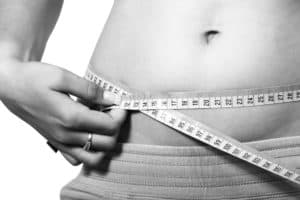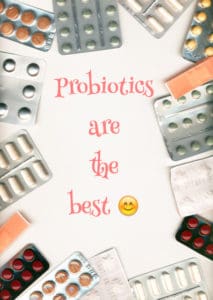Have you tried numerous diets and even when sticking to them with perfect discipline, still can’t seem to lose weight? Well, within the last few years, research has revealed a fundamental breakthrough that could be the key to weight loss…a healthy microbiome!
What is the Microbiome?
I have written about the microbiome many times (here, here, here) as well as in my eBook. But let’s refresh our memories.
The microbiome is made up of trillions of non-human microbes that govern our gastrointestinal tract. The microbes are a combination of bacteria (both good and bad), yeast (both good and bad), and some viruses and other microbes. Bacteria make up the majority of the microbiota and we hope, ideally, that we have more good than bad bacteria.
The bacteria have many roles: digesting our food, controlling our appetite, metabolism, and immune system, as well as cuing our body to store fat. They can also affect our mood and how genes are expressed. The microbiome make up about 90% of all your cells, and they are not human. The microbiome is an entirely separate ecology that works in conjunction with the rest of our body’s processes. When the bacteria and organisms of our microbiome function at optimal levels, so do we. But when our microbiome is out of balance due to things like damaged intestinal walls, too much bad bacteria, not enough of the good bacteria, and stress, our microbiome suffers, and we will feel the effects. With lots of bad bacteria, our gut often craves sugar and can be responsible for: an individuals inability to lose weight, increased fatigue, anxiety, depression, brain fog, headaches, acne, congestion, frequent colds and infections, joint pain, and muscle pain- many things you may not realized were linked to our gut! In fact, an unhealthy microbiome is linked to ALL illnesses and diseases.
When damaged, healing our microbiome and keeping it balanced is essential to our overall health. A healthy microbiome ensures we digest our food properly and get the vitamins and minerals we need.
Research shows our microbiome is tremendously dynamic and can change composition within 24 hours in response to stress, antibiotics, and illness, and can also change within weeks or days in response to diet, supplements, and exercise. The typical western-American diet is full of highly processed high fat and sugary foods which feed the bad bacteria and yeast.
The microbiome and your weight
Some scientists have argued that the destruction of the microbiome is a huge factor behind the obesity epidemic. There was a study done on mice, where germ free mice were given gut bacteria from an obese person and the mice became obese. What are some of the ways this happens?
- An unbalanced microbiome can negatively affect our immune system leading to inflammation. Inflammation is an immune system response that can lead to weight gain.
- An unbalanced microbiome has lead to damage of the intestinal wall creating a problem called Leaky gut. Leaky gut is a condition where the tight junctions of your intestinal wall open allowing contents/food to leak through. This causes the immune system to attack foods that normally would be healthy, leading to even more inflammation. In addition to inflammation, the research shows leaky gut leads to: impaired glucose metabolism, insulin resistance, obesity, and contribute to the development of metabolic syndrome, type 2 diabetes, inflammatory bowel diseases, autoimmunity and carcinogenesis. (Study: The role of dysbacteriosis in obesity, insulin resistance, diabetes and metabolic syndrome)
- An unbalanced microbiome can disrupt our hormonal balance. As a result, the hormones that make you feel full or hungry are out of sync, making it hard for you to notice when you are full or have eaten enough. (Study: Gut microbes affect satiety-inducing signaling leading to weight gain)
- Some bacteria species can extract MORE calories from the same foods, compared to other bacteria species. (Study: Bacteria causing weight gain are thought to induce the expression of genes related to lipid and carbohydrate metabolism thereby leading to greater energy harvest from the diet. )
- Bacteria can influence the way your cells store and release fat. (study: Gut Microbiota interacts with the individual’s epithelial cells to indirectly control energy expenditure and storage.
All these things can cause the body to gain weight.
What to do
Fortunately there are things we can do to heal our guts back to health! In my practice I use the 5 R program which is more rigorous that what is described below (and in my eBook) but it is comprehensive and personalized. And it works! But what is described below is a good general plan for a lot of people.
- Eliminate the processed, high fat, sugary foods in our diet. By eliminating the processed foods and sugar we stop feeding the bad bacterial in the gut.
- Eat a lot of vegetables and fibers. These feed the good bacteria.
- Be sure to eat healthy fats such as avocado, fish, olive oil and nuts. These are good for the gut but also keep up your metabolism while you ‘diet’.
- Eat fermented foods such as kefir and sauerkraut. These fermented foods have tons of beneficial bacteria.
- Take a probiotic. (good bacteria in a concentrated pill form)
What is a good probiotic?
- Can make it through stomach acid with the microbes still alive
- Contains many (5-14) strains of bacteria
- Has 25-225 billion CFUs
- Some specific strains to look for:
- Acidophilus
- Plantarum
- Rhamnosis
- Gasseri
- Bifido bacteria (many good strains)
Getting a good probiotic at the store is difficult. I recommend Klaire Labs or Pure Encapsulations, both of which can only be bought through a health care practitioner. Feel free to use patient assess code “dianne” at emersonecologics.com to order whatever you need.


